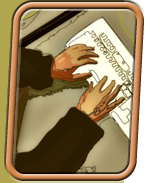|
|
||||||
|
|
|
|
||||
|
|
|
|
|
|
||
|
|
||||||
|
|
|
|
||||
|
|
|
|
||||
|
|
|
 |
|
|
|
|
|
|
|
|
|
|
|
|
|
|
|
|
|
|
|
|
|
|
|
|
|
Gruesome Gaijin Far Eastern Economic Review Bad things happen in novelist Ryu Murakami's Tokyo. High-school girls sell themselves. A bum turns up dead. Latina hookers live the hard life. And innocent and lonely people are cruelly murdered and left to rot. Rot is a familiar Murakami subject. Originally published in Japanese in 1997, In the Miso Soup is now available in an English translation. It is vintage stuff from Japan's premier contemporary literary bad boy: provocative and lewd in plot, bleak and frustrated in outlook. From the author of the raunchy novel Almost Transparent Blue and the film Tokyo Decadence, which he wrote and directed, one has come to expect sex and violence. Plenty of both fill this book. The novel revolves around Kenji, a "nightlife guide" for foreign tourists, and Frank, an American "on business" in Tokyo. The pair soon make their way to the sleazy Kabuki-cho district where Frank confirms what he believes about the city. "According to what I've read," he tells Kenji in his gee-whiz way, "you can find it all here — Tokyo's like a department store of sex!" He is right, of course. The city is chock-a-block with erotic offerings: "telephone" clubs, omiai (match-making) pubs, "exclusive" clubs, Chinese and Korean emporiums and so on. After hitting a few joints, the two men wind up in an omiai pub, which is where the book's gory key events happen. The murders of Japanese clients by Frank in the pub are so grotesque, so prolonged and so detailed that they demand explanation. Murakami provides it: Frank has been violent since he was a child and was partially lobotomized. But the American killer remains an unsympathetic character. Which may be the point. "Before Frank had turned up," Kenji narrates, "this pub was like a symbol of Japan, self-contained, unwilling to interact with the world outside, just communing with itself in every breath-mmm, ahhh." Pronouncements like this will catch the ear or eye of anyone who reads Japanese media, where foreigner-perpetrated crime is an undying topic. Tirades about dangerous gaijin — or foreigners — are the kind of thing one expects from a right-wing politician or talk-show host. Coming from an iconoclastic novelist, it's surprising. Murakami fails to make Frank wholly human. In the best fiction, readers empathize with even depraved individuals, but Frank stays out of reach and is finally unknowable. Worse, he comes off as one more inscrutable and unwanted foreigner meddling in Japan's internal affairs. Murakami would have done better to stick to Japanese characters. He certainly has lots to say about his native country. From the blowhard TV analysts to the despairing men and women, Murakami's Japan is a repository of post-modern anomie, wallowing in a welter of its own problems. "Parents, teachers, government — they all teach you how to live the dreary, deadening life of a slave," Kenji reflects. "But nobody teaches you how to live normally." Least of all, apparently, homicidal Americans.
|